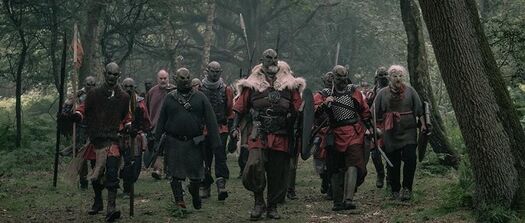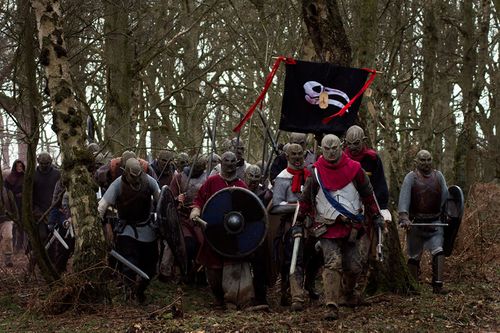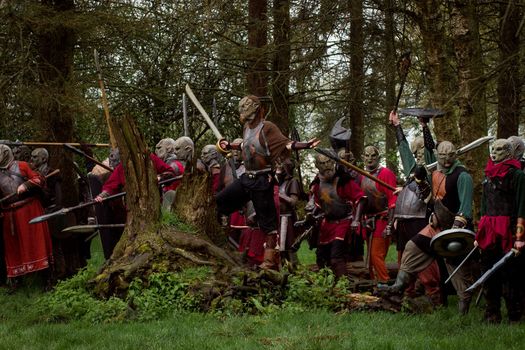Jotun
Overview
The Jotun are orcs who dominate the lands to the west and north-west of the Empire. Historically they have been especial threats to Wintermark, the Marches and the Navarr territory of Liathaven. They are barbaric by Imperial standards, but they are neither savage nor primitive. They enshrine the warrior-ideal, and seem to fight the Empire as much for the joy of battle as for any desire for territory or hate for the humans.
The Nation
Much of what the Empire knows about the Jotun has come from interviews with slaves, both orc slaves and human slaves taken by the Jotun who later escaped. They are a warlike people that values strength-in-arms and fighting-spirit as their highest virtues; to become more like their ancestors, they seek out challenges against which to test their might and their nerve. While they may view climbing a mountain, wrestling a mandowla or swimming across the Gullet to be renown-worthy acts, they seek true glory and renown in war.
The Jotun are literally defined by war, only those who are prepared to take up arms to fight against the enemies of the nation are considered to be people, everyone else is either an enemy or a thrall. War is seen as the greatest endeavour, the only proving ground where the nation can truly demonstrate their worth, for the Jotun believe that only those who die in battle are able to cross the Howling Abyss. In battle they are joined with their ancestors, whose words carry them to greatness and who wait ready to take the farthest shore if they fall. A battle is about the nation against their enemies - it is never about the individual. Small groups of warriors may pick fights with individuals, but they regard that as a fight - not a battle. A battle is the moment when the Jotun come together as a people to overcome their enemies. Victory is predicated not on individual heroics but rather on the ability of the nation to fight together.
Although the Jotun love war, they are a disciplined law-abiding people who have no time for gratuitous violence. War is seen as a worthy endeavour, a courageous and bold action that strengthens the Jotun people by giving them the chance to defeat their enemy. Internal feuding and confrontation by comparison is viewed as indulgent and greedy; those who start mindless fights or seek victory in fights or battles that do not enrich their clan are treated as criminals, or traitors if their action weakens their clan. Punishment is swift and severe.
Of all the great Orc nations, the Jotun are without doubt the most pious. Most clans will decorate shields and armour with symbols of their favoured ancestor. In battle their ranks are accompanied by ghodi, fighting priests who invoke the blessings of the ancestors, bringing healing and great strength to those the ancestors deem worthy. Ghodi, even weak ones, are treated with great respect by the Jotun, but this pious attitude extends to others they deal with. The Jotun have scant regard for the tenets of the Imperial Way, regarding reincarnation as a naïve myth but despite this they have been known to give special treatment to Imperial priests on occasion.
Jotun tend to act in a fashion identified by their Imperial neighbours as "honourable." They almost never use poison or venom, for example, preferring to win their battles by strength of arms. They may use complex tactics, but rarely employ ambush or other guerrilla tactics unless they are greatly outnumbered. They will usually accept a surrender unless they have reason to believe they are being tricked in some manner, and often allow injured opponents to retreat. They have also been known to allow opponents who have fought bravely to gather their dead or injured, or retreat from the battlefield - while ruthlessly crushing those who they believe have behaved in a treacherous manner. However, they are known to greatly respect those who fight unarmoured or against impossible odds... and express that respect by giving such opponents a glorious and honourable death in battle.
Those they defeat in battle are given a simple choice - to join the Jotun and fight for them - or to become a thrall - the property of the jarl who captured them. Most thralls live as serfs, confined to land claimed by their jarl they labour to provide food for the jarl's clan. In return the jarl's clan provides the thrall and their family with protection and sufficient food to survive. In effect the thrall is a slave but with one vital distinction - they may cease to be a thrall and become Jotun at any time - simply by agreeing to take up arms and fight for the clan. Most thralls are condemned to a miserable life of hardship, but those few with valuable skills live a better life, serving the clan as traders, crafters or sailors on the Jotun vessels.
5 things to know about the Jotun
- Born to war - when the Jotun are not engaged in war, then they are preparing for one
- Fiercely honourable - the Jotun strive to follow a simple code of honour - and despise those who break their oaths
- Conquerors by nature - those they defeat must join the Jotun armies or serve the nation as thralls
- Revere their ancestors - the Jotun are the most devout of all the orc nations and treat their ancestors like gods
- Seek death in battle - the Jotun believe that their ancestors return to aid those who die in battle
What the Jotun are not
- They are neither barbaric nor cruel - The Jotun revel in war, but they do not slaughter for the sake of it and see no honour in killing the helpless.
- They are not slavers - Thralls have no real rights and may be treated as property by the Jotun, but they can cease to be a thrall at any time - simply by taking up arms and fighting for the Jotun.
Warriors of the Jotun
The bulk of most Jotun armies are bands of warriors drawn from the many minor nations ruled over by the Jotun. Although these are orcs who have opted to fight for the Jotun after they being conquered, their loyalty to their Jotun masters is strong. From the Imperial perspective there is little to distinguish these forces from the countless minor nations that are incorporated into the armies of the Thule, Druj or the Grendel. Most own little more than a sword and a breastplate usually worn over a plain tunic or similar. In battle they form up and fight in mobs along tribal divisions. What does make them distinct is the command and leadership of the Jotun commanders - there is none of the brutal savagery of the Druj, nor the caution of the Thule. Jotun commanders glory in war - a chance to prove yourself to the ancestors in battle - they revel in it. Those that follow their example - even non-Jotun - gain status, wealth, and power by impressing their Jotun masters with their ferocity and aggression.
The elite troops in the Jotun's arsenal are the Kirkja, the pious warriors whose lives are pledged to emulate the triumphs of the greatest of the Jotun ancestors. These soldiers are well trained and zealous - eager to engage with the Empire to get the chance to prove themselves. There are three major groups of Kirkja - each devoted to a powerful Jotun ancestor - drawn from the temples spread across the Jotun lands. They are the best equipped Jotun on the battlefield and their ranks usually include several ghodi - mysterious priests who are able to invoke the power of the ancestors to heal wounds and repair shattered limbs.
Each region in a Jotun territory generates a fyrd when it is conquered by the Empire. As the Jarl and their warriors are forced to retreat from their lands, they form up into a fyrd, a warband with a military strength of five hundred. A fyrd is unable to act independently of fortifications or armies in the territory; it will only act to support a Jotun army in the territory or a fortification if there are no armies present.
A region's fyrd can be dismantled by killing the jarl or through other opportunities.Magic
Like all other intelligent beings the Jotun employ magic, but they do not seem to consider it a particularly appropriate weapon for the battlefield. The majority of Jotun magicians appear to focus of healing and restoring the limbs, armaments or general health of the warriors. There are few battle-magicians among them, and even those tend to focus on swift casting the heal and purify incantations, or on empowering warriors rather than the more aggressive spells.
History
The Jotun are geographically divided but culturally united. The northern Jotun control the area dubbed Kalsea by the Winterfolk. They tend to be a little more cautious and more traditional than their southern cousins, and have a great deal of experience fighting the forces of Wintermark - they have been raiding into Sermersuaq and north-western Kallavesa since before the arrival of the Steinr. There are known to be a number of human settlements scattered across Kalsea, whose inhabitants offer tribute and fealty to their orc masters. These humans often fight alongside the Jotun, and seem to have little love for the Empire; while they are clearly not the equal of their inhuman overlords, they seem to have a social position below that of a minor orc nation but above that of slaves or thralls. In 371YE the Empress Britta dealt the northern Jotun a crushing defeat, driving them back into Kalsea and while they have made a few raids into Wintermark since then, they have not launched a significant attack against the Empire.
The southern Jotun occupy the area the Winterfolk call Narkyst. In pre-Imperial times they occupied much of western Bregasland and accompanied their northern cousins in raiding Kallavesa. With the arrival of the Marcher army from the east, they were eventually driven out of the marshes. Their numbers were swelled by the lesser nations driven westward from what is now the Marches; according to historians, they engaged in a brutal war of dominance with the lesser nations, conquering them and requiring them to offer fealty. Today the southern Jotun are much more aggressive than the northern; in 347YE they began a campaign of conquest against the Mournwold, sweeping through Liathaven and driving out both the Navarr and the Marchers.
At various points in their history, the Jotun have entered into pacts with the humans of the Empire, most notably during the reign of Emperor Guntherm. These treaties reflect earlier conventions between the Jotun and the Winterfolk in the years prior to the formation of the Empire. Such pacts and treaties take the form of ceasefires, and rarely last more than two years although in some cases they have been renewed. Some thanes living on the borders, and even a few Marcher stewards have engaged in smaller-scale pacts with individual clans of Jotun in a similar way.



